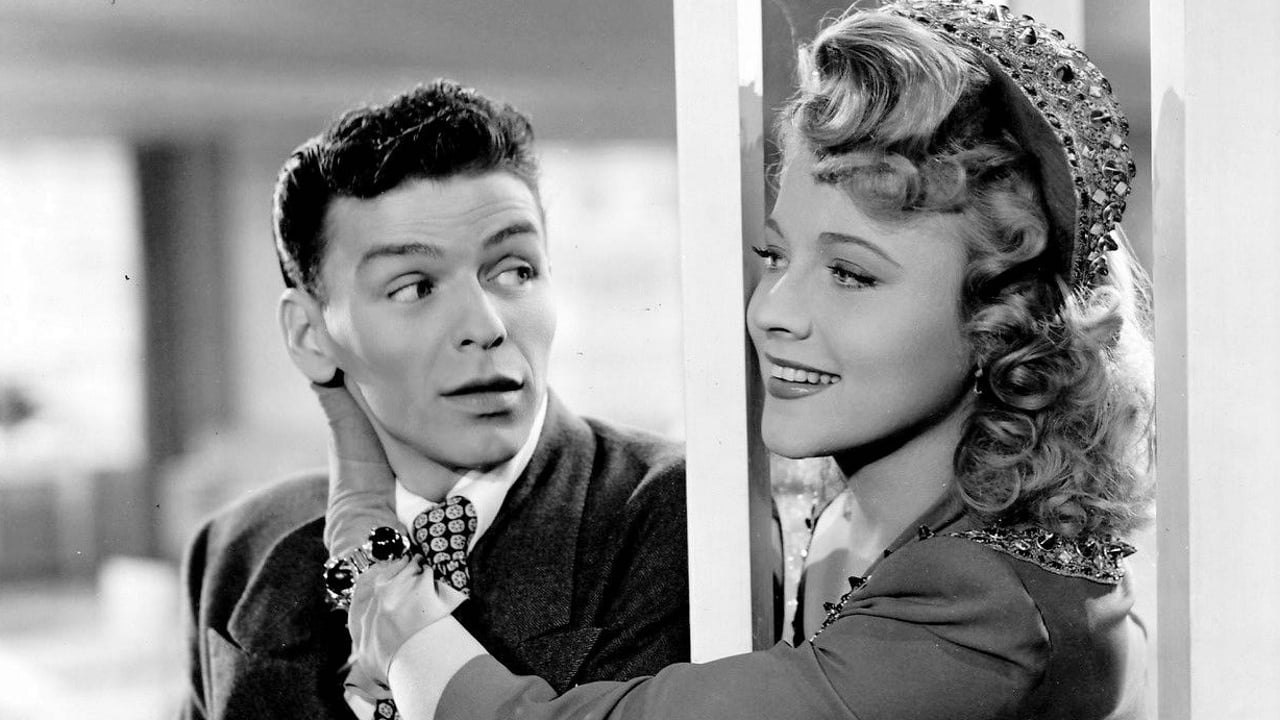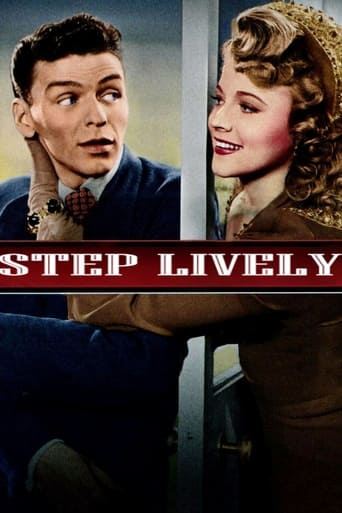

Yes, it's a flimsy but very funny, fast-paced script. George Murphy's brief dancing and comic delivery is excellent. Sinatra is terrific in his young, vibrant, handsome and romantic best. His ever move from his first entrance shows natural skill and timing. The songs are vastly better than most 1940s musicals. Cone Out Wherever You Are sticks with me for days whenever I hear it. DeHaven is gorgeous as us AnnJeffries. Whenever I watch a film like this I lament that there is no well known talent alive today that could duplicate this film with 1/2 the charm.
... View MoreIn this comedy of errors, a broke producer is staying in a swanky hotel without paying his bill. His excuse? He's producing a hit Broadway musical and will soon come into a lot of money. It's not enough that the hotel owner is about to evict him, the playwright he's also scammed out of a bundle of money under the pretense that he'll produce his play shows up and demands to see the show! The producer discovers that the playwright can sing, and he tries to persuade him to star in his musical, hoping he won't notice that the drama he originally wrote will never see the light of day.The playwright is played by Frank Sinatra, in his first acting role where he doesn't play himself. The first four films he acted in, he literally played Frank Sinatra. Although he does sing several songs in this zany 1940s musical, he must have been relieved to play a character with a different name. Jule Styne and Sammy Cahn wrote the songs for Frankie and Gloria DeHaven, but unless you're a die-hard fan of silly musicals, this one will probably feel a little campy and tiresome. If you like very light-hearted stories, like On the Town or Take Me Out to the Ball Game, you find good company in Step Lively.
... View MoreThis lively forgotten musical romantic comedy will probably remind you of the style of some of the B&W Rooney-Garland films of the early '40s, with some of the musical numbers impromptu romantic songs, while others are elaborate staged productions, It may also remind you of the Marx Brother's "Room Service", upon which the background story is based. Along with some other reviewers, I think you will find it clearly the most entertaining film in the current Sinatra Early Years DVD collection. You may even find it on par with or better than the 3 later Kelly-Sinatra films. You will get a rare opportunity to hear and see Gloria DeHaven in her youthful heyday, with lots of singing opportunities. Too often, she just got to sing one song when included with other female singers and dancers. I often prefer her smooth sexy voice to that of Garland's. We also have Anne Jeffreys, who sings a couple of songs. I can't complain about her singing or acting either. And George Murphy, who probably has the most screen time of any actor, can sing , tap dance and act, with a fair dose of charisma. He had previously costarred with Garland and Kelly in "For Me and my Gal", and was featured in "Broadway Melody of 1940" and "This is the Army"Here, I would like to describe in some detail the various musical numbers, and skip commenting on the background theatrics and comedy, which others have summarized(except to agree that there is too much shouting between the various characters). There are 8 musical numbers, featuring 6 songs. Murphy and Gloria, backed by a mixed chorus,start things off with a rousing staged "Where Does Love Begin?"(and friendship end?), which includes some tap dancing by Murphy...Next, another staged production, featuring Gloria in a bubble bath, surrounded by a female chorus, crooning the catchy "Come In, come In, Wherever You Are". A male chorus changes the lyrics to "Come Out", and she emerges(beautifully clothed). Gloria, various males and Sinatra then take their turns singing a reprise, followed by a Gloria-Sinatra romantic dance..In the next musical scene, Sinatra croons "As Long as There is Music" to Gloria. Anne Jeffreys overhears, and becomes infatuated with Sinatra. Later, she catches Sinatra in a phone booth and makes a play for him, but he resists, preferring the tamer Gloria.He escapes and she chases, while they take turns singing bits of a modified version of the opening "Where Does Love Begin?".Finally, he pushes her into an elevator , where she becomes entangled with others, while he escapes down the stairs..Later, Sinatra and Gloria resume their romance. They take turns,back and forth, sometimes as a duet,singing "Some Other Time", with dancers in the background. Ironically, Sinatra soon after gets angry with Gloria about some performance credits and supposedly quits the show for some distant destination(to later return and make up).. Now, we are ready for another floor show. Anne Jeffreys is the lead singer, with female chorus, in the rousing "Why Must there be an Opening Song?" This is soon followed by an elaborate Ottoman-themed stage production, featuring the complex song "Ask the Madame", led by turbaned Murphy, who functions as the MC, periodic singer and magician. It also features the periodic singing of fortuneteller Gloria, and choruses. One of the scenes has a row of women hidden in apparent baskets, which will later function as their dresses in a dance.To the music of a flute, their gloved hands and forearms emerge, convincingly mimicking swaying cobra heads. Quite an interesting show, including Murphy's magic tricks.Now, we are ready for the final music number, impressively staged, if not nearly as interesting as the previous one. It features a reprise of "As Long as there is Music", which Sinatra previously crooned to Gloria. Sinatra, in a spotlight on an otherwise dark stage, starts things off, soon joined by a female chorus, all in white. Gloria then descends a long cloud-like staircase, while singing, as if a goddess descending from heaven. She and Sinatra then duet while dancing. Murphy and dance partner then sing and dance, with gleaming white columns and chandeliers in the background, against a pitch black backdrop. All file out into the audience, while singing, and the 3 stars say goodbye.Sound like a fun time? You bet! Too often, in his other '40s films, Sinatra was portrayed as a skinny timid romantically naive halfwit, and had to suffer the ultimate romantic rejection of a Kathryn Grayson("Anchor's Away", "It Happened in Brooklyn") or Esther Williams{"Take Me Out to the Ball Game") or meekly surrendered to the sudden Anne Jeffreys-like infatuation of man-hungry Betty Garrett(last title, and "On the Town").
... View MoreAs a lifelong Sinatra fan who has seen all the movies and owns all the CDs I have no hesitation in rating this the best film he made in the 40s, his best in fact until Meet Danny Wilson right at the start of the 50s. In fact it's right up there with the two great musicals he made in the 50s, Young At Heart and High Society and it's no coincidence that all three had rock-solid scripts, had in fact begun life in each case as non-musical dramas/comedies. Young At Heart was a successful novel by Fanny Hurst which became a fine drama, Four Daughters; High Society was a play, The Philadelphia Story, tailored especially for Katherine Hepburn who played it both on Broadway and the subsequent film version and Step Lively began as a farce on Broadway and became a film vehicle for the Marx Brothers. This means that Sinatra isn't asked to carry the film and we can enjoy George Murphy as a sort of pre-Bilko complete with two sidekicks, Wally Brown and Alan Carny, in a running battle with Walter Slezak, Adolph Menjou and Eugene Palette. The six great songs provided by Jule Syne and Sammy Cahn are a bonus even those in which Sinatra does not feature (Ask The Madam). Sinatra is allowed to develop his personality into something - albeit only a little - more than the gauche 'himself' he played in Higher And Higher and once he got to MGM he was back to gauche. I suspect that Anchors Aweigh would seem very dated today despite a fine score, The Kissing Bandit was always a joke with Take Me Out To The Ballgame only a notch better and I've always found On The Town vastly overrated which leaves It Happened In Brooklyn as the best of a mediocre lot. Step Lively - seen today, May, 2008, retains its freshness and failed completely to disappoint.
... View More